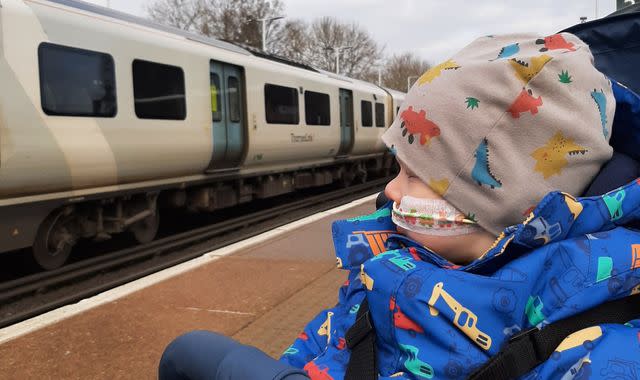Toddler with a 40% chance of surviving past age five fighting for a 'game-changing' cancer vaccine

Train-obsessed toddler Teddy has just a 40% chance of living past his fifth birthday.
The three-year-old, who has charmed nurses and doctors at hospitals around the UK, is facing one of the most aggressive - and rare - forms of childhood cancer.
But for children like Teddy, there is the possibility of long-term remission in the form of a "lifesaving" cancer vaccine. Currently, it's only available in the US, but there is a chance the game-changing jab could be coming to the UK.
There are less than 100 cases a year of neuroblastoma in the UK, and the cancer is most common in children under the age of five.
Treatment is a gruelling regime of surgery, stem cell transplants, immunotherapy and chemotherapy. It is hoped when this is finished - scheduled for November - the disease will be in remission.
The next stage would be a vaccine that would stop it from returning because if Teddy does relapse, his chance of survival drops to just 5%.
How does a cancer vaccine work?
While a vaccine against cancer seems like the work of science fiction, the results from early-phase trials are promising.
Described as a "maintenance option" it doesn't cure the disease but is given to patients in remission. It works by inducing a patient's immune response to produce its own Anti-GD2 antibodies which then find and attach themselves to residual neuroblastoma cells, preventing cancer from returning and spreading again through the body.
"This would give not just short-term effects, but actual potential long-term immunity to cancer," said Katherine Lichten, Teddy's mum.
The treatment, currently in phase two trials at the Memorial Sloan Kettering Cancer Centre in New York, is the only paediatric tumour vaccine in existence.
For Liam Scott it really was lifesaving. After being diagnosed with neuroblastoma aged three, and following months of his own treatment, he was given the jab.
In 2022, three years after that awful diagnosis day, his parents proudly reported he was cancer-free and thriving.
And Vicky Inglis, head of family support services at Solving Kids Cancer, said he remains in remission to this day.
"This gives hope to those families who have decided to pursue this option," she said.
But the cost of getting on a trial for the vaccine is not cheap, and the Lichten family are currently fundraising £250,000 to pay for it.
A gruelling regime of treatment
Katherine's "whole world was turned upside down" when Teddy, feared initially to need surgery for appendicitis, was found to have a cancerous mass that had spread to his hips, spine, and bone marrow.
Since his diagnosis in June 2022, Teddy has faced six rounds of induction chemotherapy, a stem cell harvest, high-dose chemotherapy, and a stem cell transplant.
He still has another round of high-dose chemotherapy and a stem cell transplant, before potential surgery and 12 sessions of radiotherapy.
His frontline treatment will conclude with six months of immunotherapy.
Read more:
Cancer vaccine produces 'promising results'
Isla Caton: Seven-year-old girl dies
It is only then that Teddy will be eligible for the vaccine, and he has to receive it within a month of finishing immunotherapy - a tight window for the family to finish raising funds and get him to the US.
"Our absolute worst nightmare is Teddy relapsing and losing him," said Katherine.
Treatment 'like being hit over the head with a sack of bricks'
Families forced to seek potentially life-changing treatment abroad face an impossible choice - raise the eye-watering amount of money required, or face losing their children.
While the Lichten family raised an impressive £24,000 within a few days of launching their fundraising page, they are aware they still have a long way to go.
Katherine said: "When Teddy was first diagnosed I took to the internet like any Millennial mum and stumbled upon news of this vaccine quite quickly. And my initial reaction was, we've got to do this."
But she said the reality of treatment soon hit them.
"You feel like you've been hit over the head with a sack of bricks and you can barely think forward to getting out of bed in the morning, let alone thinking about fundraising that huge amount."
But after a few weeks at home with Teddy, during a gap in his treatment, the family had the space to decide now was the right time to go abroad.
Could the vaccine come to the UK?
There is a chance the jab could come to Britain and the whole of Europe with Solving Kids Cancer lobbying the UK government to roll out trials in this country.
"It is a huge amount of money and a huge amount of stress when you've got a sick child," said Vicky, from the charity. "So to be able to have an international trial where a centre is open here in the UK would just be incredible."
At the moment, some parents choose not to seek treatment abroad: "It's a choice for parents to access this maintenance option because it's just not proven, and the problem with that is the NHS can't fund something that is not proven."
Katherine said while it would be too late for Teddy she would be pleased for the families that come after them.
"I feel really strongly that this vaccine offers a huge potential to save children's lives," she said.
"And if it could be trialled internationally across a large enough number of children you could get meaningful results that could prove it categorically works.
"And then to become a part of NHS treatment, that would be fantastic. Maybe the parents of children who get diagnosed in a few years' time, maybe they won't be having to do what we're doing."

 Yahoo News
Yahoo News 
